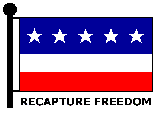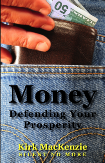

The Equalizer Amendment dramatically reduces federal government intrusiveness in
three ways. First, it effectively ends all unconstitutional activities of the federal
government, and that includes essentially all of its most intrusive activites (see
“What is Unconstitutional?”). To see how the amendment accomplishes this, see “Disobedience
of the Constitution.” Second, the amendment prevents the federal government from
playing favorites, engaging in crony capitalism, providing subsidies to selected
industries, interfering selectively with trade, etc. For a description of how this
is accomplished see “Over-
Federal control of drugs, including abused drugs and pharmaceuticals, is unconstitutional.
It is an outgrowth of the protection racket on one hand and crony capitalism on the
other. Either way, it has served to make many a federal official feel important while
enhancing the anti-
The Equalizer Amendment ends the wasteful War on Drugs by putting drug decisions back in the hands of the states and the people. It does so by making unconstitutional federal legislation extinct and/or unenforceable. See “Disobedience of the Constitution” to find out how the amendment accomplishes this aim.
The third clause in the Equalizer Amendment is, “No federal law or regulation shall
discriminate against or in favor of a private entity or citizen or a group of such
entities or citizens on the basis of race, religion, gender, ethnicity, industry
type, perceived importance, contributions of money or favors, lobbying activities,
or domestic location.” This clause prevents the federal government from treating
one citizen, company, or industry differently from any other. Slapping tariffs on
imports or exports is not allowed unless the same tariff is applied to EVERY import
or export. Of course, such a restriction keeps politicians from favoring one citizen,
company, or industry over another and thereby removes most of the fun from the politician’s
standpoint. Moreover, the damage to trade that an across-
People are beginning to become aware of the furtively-
The Equalizer Amendment addresses this problem with the following clause: “Any department or entity that Congress creates shall be treated as a government department or entity, unless the department or entity is made subject to all laws applicable to private entities.” Thus, the Fed, which was created by an act of Congress, must become either a government department or a private entity. Either way, as a result of the first clause of the Equalizer Amendment, the Fed will be subject to Security and Exchange Commission reporting requirements and any other local, state, and federal requirements governing private enterprises. Once the facts come out, there will be a major push to remove the monopoly status of the Fed and to introduce more solidly based currencies that are not subject to manipulation by elitist powers.
Confiscation of property or property rights by the federal government is a violation of the Fourth Amendment: “The right of the people to be secure in their persons, houses, papers, and effects, against unreasonable searches and seizures, shall not be violated, and no Warrants shall issue, but upon probable cause, supported by Oath or
affirmation, and particularly describing the place to be searched, and the
persons or things to be seized.” No federal power to take property or property rights from law abiding citizens was ever ratified.
The Equalizer Amendment gives citizens the ability to sue the federal government
in local, state, or federal courts with the same ease as that with which the federal
government can sue a private-
The freedom of citizens to enter into contractual agreements with each other of their
own free will with the various risks assigned to the parties in an agreed-
In fact, this impairment of contracts by STATE OR FEDERAL GOVERNMENT is unconstitutional. Quoth the Constitution: “No State shall enter into any Treaty, Alliance, or Confederation; grant Letters of Marque and Reprisal; coin Money; emit Bills of Credit; make any Thing but gold and silver Coin a Tender in Payment of Debts; pass any Bill of Attainder, ex post facto Law, or Law impairing the Obligation of Contracts, or grant any Title of Nobility.” Impairing contracts is not among the enumerated powers of the federal government, and it is not allowed as a power of the states.
The Equalizer Amendment, which makes it easy to sue the federal government for unconstitutional acts (see “Disobedience of the Constitution”) also makes it easy to sue the federal government for not upholding the Constitution if the federal government neglects to enforce state compliance with the Constitution.
"Giving money and power to government is like giving whiskey and car keys to teenage boys."
-
Hits On This Page
Sponsors
and
Affiliates







